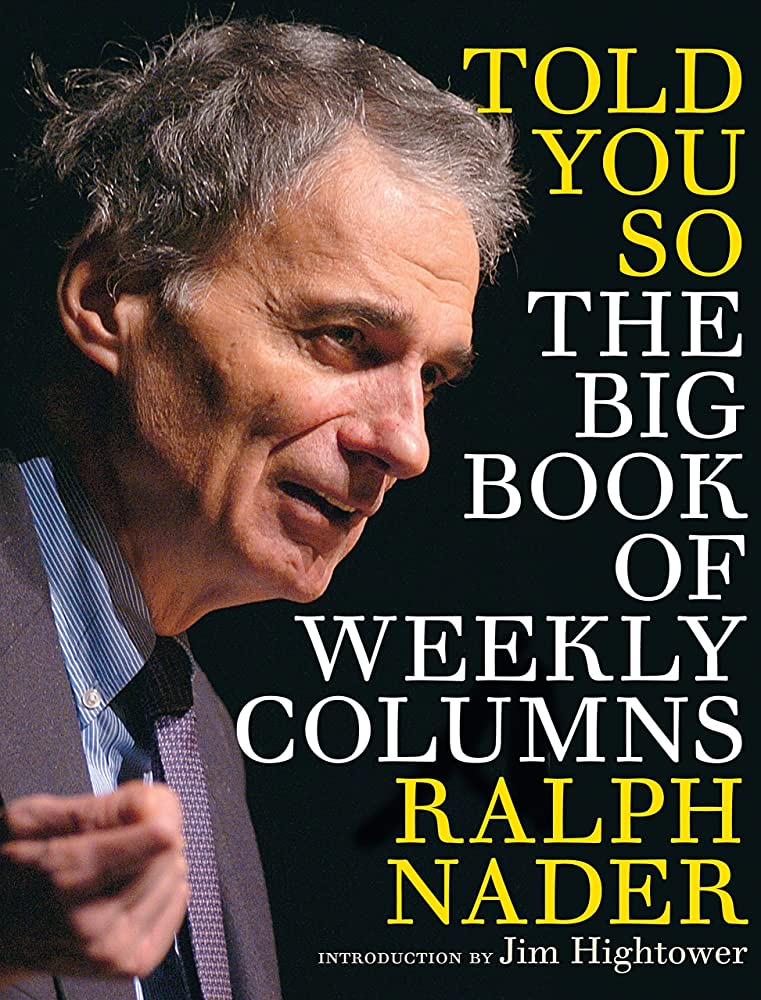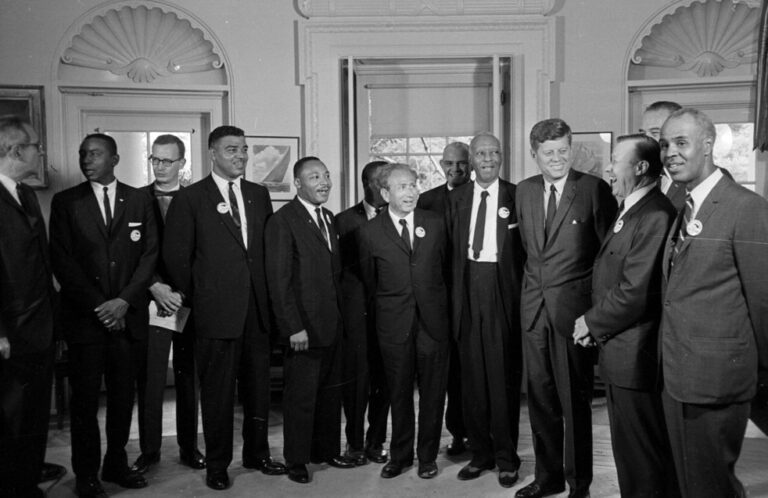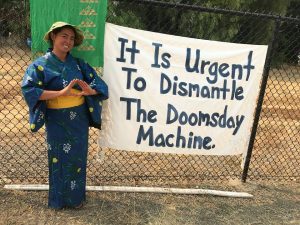This is an episode of Reality Asserts Itself, produced on December 19, 2013. On RAI with Paul Jay, Ralph Nader says the reforms of the 1960s and ’70s are no longer possible as Congress is bought and sold by a small number of very rich people and commercial interests.
PAUL JAY, SENIOR EDITOR, TRNN: Welcome back to The Real News Network. I’m Paul Jay in Baltimore.
We’re continuing our series of interviews with Ralph Nader on Reality Asserts Itself.
Thanks for joining us again, Ralph.
RALPH NADER, POLITICAL ACTIVIST, AUTHOR, AND ATTORNEY: You’re welcome.
JAY: So in part one I did the long-form interview of Mr. Nader, and below this video player you will see all the various accomplishments of Ralph. But I’m just going to go over once again some of the legislative accomplishments, ’cause it leads into my next question. Nineteen sixty-six National Traffic and Motor Vehicle Safety Act; ’70 Clean Air Act; 1970 also Occupational Safety and Health Act, which leads to the establishment of the Environmental Protection Agency; the Freedom of Information Act in ’74; Clean Water Act in ’77; Foreign Corrupt Practices Act, Mine Safety and Health Act, all in ’77; Whistleblower Protection Act in ’89. And it goes on.
I’m about to say something which I assume you and I are going to agree on. Concentration of ownership leads to concentration of power, political power. Have we reached a point in the United States where there is such concentration of ownership, and thus such control over the politics of the country, that these kinds of reforms aren’t possible anymore?
NADER: Well, we couldn’t have gotten through today what we got through in the ’60s and ’70s, ’cause Congress is, you know, heavily bought and sold. Talk about concentration of ownership, look at the ownership of campaign money. I mean, it’s in the hands of a small number of very rich people and commercial interests.
So, no, our democracy has definitely declined. It’s decayed in so many ways. You can see the indicators everywhere. The rise of poverty, for example, the rise of consumer debt, homelessness, the home foreclosure, the collapse of Wall Street without any retribution by the government–nobody went to jail from these Wall Street crooks
JAY: I mean, that seems to be a rather critical one.
NADER: Well, that’s a perfect example
JAY: Not just about whether they went to jail or not, but they haven’t done anything about why that triggered the financial crisis in ’08. There hasn’t been really serious reforms that would not stop it all from happening all over again.
NADER: No. There’s a law called Dodd-Frank law, but it’s not going to be very well enforced.
But the important thing is they’re–Wall Street’s starting with these multitiered derivative gambling again that brought the economy down. And so, yeah. I mean, because these guys are immunized, they–even when they lose their jobs as head of the banks, they take away two, three hundred million bucks. You have a [noUthA] giant corporate system in this country taking over a government that is [noUthA] when it comes to messing with the people. I mean, you can’t sue anybody in the government now, because the courts say, well, you have no standing to sue. You’re a citizen. You have no standing to sue. So you can’t challenge corruption in the courts. You can’t challenge illegal drone warfare in the courts. You can’t challenge imprisonment without charges unless you are one of the prisoners. You can’t challenge these systems. It’s a very clever system of control.
JAY: And if most, in my mind–I don’t know if you agree with this or not–most of what’s happening now in terms of the political paralysis and the reason why even minor reforms aren’t possible anymore is because of such concentration–concentrated ownership in finance, in media, and all the major sectors [incompr.] say the commanding heights of the economy. But there’s no going back from that. What I mean: not going to–like we’re going to go back to small businesses. We’re not going to somehow break all this up. It seems to me the only next kind of thing that can counter that, which you sort of suggested earlier, is, one, government. Two, I think you have to add to that some kind of forms–and I say some kind of forms, ’cause my guess: it’s multiple types of forms of public ownership.
NADER: And local economies, which are growing. You know, farmer to market, credit union, community banks, renewable local energy, community health clinics focusing on prevention of disease and trauma, those are really spreading. And Yes! magazine out of Seattle really chronicles that. Remember, we’re talking tens of billions of dollars now. But they’ve got to become hundreds of billions of dollars. And every time you put your dollar in these local economies, you’re taking a dollar away from the Bank of America or ExxonMobil or Pfizer pharmaceuticals. See? So that’s a good one.
Public ownership, sure, things have got to be, because these big corporations, they pick and choose what they’re going to deliver to you. And if they’re not going to deliver health care, you know, if they’re not going to deliver decent education, you’ve got to support. If they’re not going to deliver public works, you’ve got to have public investment. And that goes back, you know, hundreds of years. It goes back to the Roman Empire and before. Public works are a public function.
However, the strategy is is that Congress is made up of 535 men and women who put their shoes on every day like you and I, and they have enormous power. If the people control it to turn the country around, ’cause it could turn the executive branch around–they have power over budgets, over taxes, over what’s being spent, what’s not being spent, over budgets to criminally enforce the law against corporations and executives, power to stop wars.
And so you start with, you know, the leverage. The leverage is the Congress, which means we have to have Congress watchdog groups in every congressional district. That’s not hard. I mean, give me one-fourth of the amount of time that birdwatchers put into their hobby to put on Congress watchers. Shazam. You won’t even recognize the Congress.
And if you say to people, look, someone knocked on your door and said, hi, I’m your new neighbor, you know, I spent 22 percent of your of your income, I can send your children off to war, I can let others toxify your air and water, I can increase your taxes, bye-bye, what are you going to say? Hey! What are you doing? You’re messing around. I was watching the fourth rerun of Friends on TV. Or you say, hey, you mean something to me. That’s your member of Congress. You better come back here to the door, ’cause I got things I want to tell you. It’s easier than we think.
But there’s nothing out there. We don’t even have the equivalent of bowling leagues in congressional districts to push forward major redirections of our society that are supported by a majority of the people–full Medicare, cracking down on corporate crime, living wage, public works 80, 90 percent support, but no muscle back home on your senator and representative. Why? ‘Cause people give up on themselves and they say, well, they’re not going to listen to us. What do you mean they’re not going to listen to you? Once you show the rumble of the people, you’ll see these politicians running for cover. You’ll see these corporations running ’cause they no longer can control the government against you to further their own greedy interests.
JAY: But the way–and I know you’ve, you know, in terms of your own candidacy tried to break this, but the way this political system has operated, that kind of pressure, you know, the Democratic Party assumes there’s nowhere else to go if you want, except you’ve got to vote for us, ’cause the other side is so far to the right, and people aren’t willing, on the whole, not to vote for the Democrats and allow the Republicans to win. And there’s–but doesn’t there need to be something new? And I know you made attempts at this.
NADER: Yeah, there needs to be third, fourth parties. Yeah.
JAY: There needs to be a movement.
NADER: But if–yeah, if there’s a groundswell, sure. It’ll all be a mix. The Democrats and Republicans, if they see a alternative political force, they may start changing, ’cause they’re out of here if they don’t. I mean, we–in the ’60s, we would go to the most corporate-indentured senators and representatives, and because of the rumble in the ’60s and the marches, demonstrations, sit-ins, right, they had their finger to the wind, they became consumer environmental champions like no time in American history. Senator Warren Magnuson, for example, from Seattle, Washington, he got through more consumer bills–I could hardly count them. And he was an arch corporate lobbyist in the Senate. But he saw the rumble back in Washington State. It’s easier than we think.
JAY: The power, though, of, first of all, in terms of financing of politics, in terms of the influence of buying advertising on television, in terms of the programming of news–and it’s–there’s a whole onslaught of cultural levers they have and other kinds of levers. But in terms of developing an alternative vision–I’m–go back to part one of our interview, when we talked about the effect of the Cold War and how it kind of led to sort of more piecemeal, limited reforms rather than a big vision–don’t we need a big vision of what a different America would look like in terms of, you know, how the economy works, how the politics works? Because, I mean, I’m sure you agree we live in a class society. You know, there’s an elite that owns stuff that has most of the power, and most people who don’t own stuff don’t have much power, and there needs to be a different kind of politics.
NADER: Yeah. And basically there’s no room in a democracy for giant global transnational corporations. They have no allegiance to this country other than to control it and ship its jobs and industries to fascist and communist regimes overseas who know how to keep their workers in their place. So you can’t have a democracy with these kinds of concentrations of power.
So you have to displace them with an expansion of local businesses which have the trust of the people. It’s only the people who’ve got to say, I’m not walking into this Bank of America anymore, and I’m going to work with a renewable energy group and with new technology, like, that decentralize. A lot of things are possible even beyond what was possible 50 or 100 years ago. So I call that the displacement economy. The more we spend with the local economies, the more we displace the sales of the big guys who pull the strings on Main Street and Elm Street U.S.A. from some skyscraper in New York, London, Tokyo, or Chicago. That’s one.
The second is, we have a policy of abolishing poverty. I mean, we are a very productive society, but we’re not spreading it out. People are not getting what they deserve for the sweat they put into their 40-hour week or two jobs, dead-end jobs, paying $500 bucks a month for daycare, and so on, commuting, spending money commuting. No. We basically say, look, a living wage based on productivity would be $20 an hour minimum or more, maybe $25 an hour, from a base of, say, 1968, taking the benefits of double productivity, one worker doing the job of two in Walmart, for example, but today, the one worker in Walmart makes less than the one worker in Walmart made in 1968 adjusted for inflation.
JAY: So, given that the government found it fairly easy to hand–you know, it was a trillion and a half dollars to the banks, why not a publicly owned Walmart?
NADER: Well, that’s what co-ops would be. I mean, there are co-ops in this country where people go. There’s a Bethesda co-op in Maryland.
JAY: But there is something about scale that–.
NADER: Scale? Well, yeah, but if you own the business ’cause you’re a co-op, you develop your own scale. You decide what your employees are going to sell back to you. If you decide you don’t want to put tobacco in, like the Berkeley co-op did years ago before it became too much of a commercial model, they were the first to say, we’re not selling cigarettes. Why? Because the owners, the consumers who own the co-op demanded it.
But we have to be willing to spend more time in shaping the economy. And right now, convenience is king. Anything is convenient. I mean, all the news recently–Amazon may be developing drones to deliver right to your home so you don’t have to wait a day or two. What’s the rush for most purposes?
JAY: Well, you don’t even have a cell phone.
NADER: I mean, it’s crazy. I mean, like, that’s it? Why don’t we have an economy that delivers food to 20 million hungry kids who go to bed at night hungry?
JAY: But what I’m getting at, like, you’ve got all kinds of rational ideas. Like, I’ve got here–here, let me show it here. There’s, like, from Ralph’s book Seventeen Solutions–and I’m sure if you had more time, you could probably come up with 50 solutions, but you can’t execute on these. You can’t, because, you know, people that own stuff have political power, and they’re not interested in these seventeen solutions.
NADER: They’re swept aside once the people arise. I’m telling you, I can say–let’s say someone says to me, Nader, you’ve been pushing for a minimum wage up to $10.50 for years and you haven’t got it. What do you need? Here’s what I need. I need 1 million of 30 million workers who are getting less today than 1968 to spend 50 hours surrounding congressional offices in town hall over a period of six months. Game over. What do you need for universal health insurance? Give me 1,000 people in each congressional district taking it as their chief hobby–you know, some people play mahjong, some people do bowling, some people watch birds–just give me 1,000 people in each congressional district, give me 200 hours a year and raising $200 to staff two offices in each congressional district with four full-time people, you’ll get it in 18 months, because a majority of the people support these changes.
JAY: So what’s stopping you?
NADER: Because you can’t get to them. You certainly can’t get to them over the mainstream media. You can’t. Like, in the old days, you’d go on the Phil Donahue show, you’d say, you know, send us your address, you know, buy this book or contact this member of Congress, and they would do it. I mean, with just 20 radio programs and stations, I blocked a huge congressional pay increase years ago, ’cause they were–the phone calls were coming in to the switchboard. Senators and representatives, they ran for cover.
So once you’re pushing changes that are supported by a majority of the people–and it’s just fair play. It doesn’t matter if it’s conservative liberal. Conservative liberal means anything in Walmart workers. They want a living wage. They don’t care care whether they label themselves conservative liberal.
Okay. So you can’t get through them over the TV channels or the–you know, talk radio is now all right wing, almost. Okay. Can you get to them over the social media? It’s very hard. Why? There’s too much social media. It’s too fractured. You can’t reach them.
So, alright, can we get organizers in the field? That’s the way to do it. We get 1,000 organizers in 435 congressional districts full-time. Somebody’s got to fund that. And that’s where my book Only the Super-Rich Can Save Us, which is a work of fiction–you just get one billionaire–you know, there are, like, 1,000 billionaires, right? And most of them, you know, they don’t care that much about the people.
JAY: Well, the book came out a few years ago, so where is he or she?
NADER: Yeah, well, that’s the point.
JAY: But it’s not in their interest to shake things up.
NADER: No, but it is in the interest of a few of them if you can ever get through their screen. You know, it’s hard to reach billionaires.
JAY: Well, you reached some.
NADER: But now, for example, we have Tom Steyer. He’s really pushing money against the Excel pipeline that the Canadians want to build.
I mean, historically the abolition movement against slavery and the women’s vote movement had rich Bostonians in New York, New Yorkers fund it. The modern environmental movement was kickstarted by rich people. So there’s a precedent for this.
So if you want to get universal health insurance, Carl Icahn alone, he’s worth $15 billion, puts $1 billion over two years, which-you know, a good strategy, competent people, not wasting money, you know, in every congressional district. How do you get universal health insurance? You persuade two-thirds of 535 people in the House and Senate. You think the drug companies and the insurance companies that are perceived by tens of millions of people as gougers, greedy, denying coverage, you know, pay-or-die in terms of the drug pricing, you think they’re going to be able to withstand that rumble from back home? I mean, they’ll run for cover.
JAY: Well, this is where–.
NADER: We did this is the ’60s. We did it with the coal industry, the auto companies. We did it with interest groups that were supposedly unbeatable. We beat them. We had a reasonable Congress. The Democratic Party had enough people to have hearings and to respond to the rumble from the people.
JAY: Well, this is what my point was earlier.
NADER: And, by the way, Nixon signed them because he was afraid of the rumble of the people coming out of the ’60s.
JAY: But I guess this is part of what we were talking about earlier. This is a different America. And have we not gotten to a point where the politics is resilient, resistant to demands? The concentration of power and the extent to which Congress is on various payrolls, you know, it’s not enough to make demands. Like, the rumbling would actually have to be kind of we’re coming to take your seats, not we’re asking you for something.
NADER: Oh, yeah. It would be all the way. You’d basically–
JAY: You know, maybe if there’s a force there–.
NADER: –there’s basically–you stand for us, Senator, or you’re history. You stand for us or you’re going to be surrounded by pickets everyplace you go back home.
JAY: So one of the things that’s blocking that from happening is that, you know, every two years is an election, and every two years it is, if you don’t support Democratic Party candidates, you’re going to elect Republicans, and people get caught up and paralyzed by this.
NADER: Well, that’s where you go into–
JAY: And ’cause there is some truth to that.
NADER: –you go into the primaries.
JAY: There’s some truth to it.
NADER: Yeah, because you’ve got gerrymandered districts. So you’ve got most of the districts are dominated Republican/Democrat. Where they’re insecure is not in November; they’re insecure in their primary. So you attack them in their primary with progressive candidates. That’s–.
JAY: Within the Democratic Party.
NADER: Yeah, even the Republican Party. Listen, we had Republican senators and representatives–the auto safety bill, the first federal regulation of the powerful auto industry for pollution control and safety, passed unanimously in the House of Representatives.
JAY: Well, this was a critique of you in your presidential campaign I think a lot of people made.
NADER: Yeah, not enough groundswell.
JAY: Well, why didn’t you lead a charge in the Democratic Party, in primaries? It wasn’t that–why wasn’t that part of a strategy to wage the struggle?
NADER: Didn’t have the media and didn’t have the money. I couldn’t get a foothold. See?
Even Kucinich, look, he was blocked from some of the debates, a loyal Democrat for 30, 40 years, Congressman Kucinich. Look at Ron Paul. I mean, they tried to marginalize him out of the Republican, ’cause they didn’t have enough oomph and they didn’t have enough resources, they didn’t have enough media.
And that’s why I think a third party is going to come with billionaires. They’re going to be enlightened billionaires. And then the minute a billionaire comes in like Ross Perot, they get massive media, they get polls. I mean, everything falls into place.
JAY: But so far, unless there’s some billionaire I haven’t heard of, the billionaire is going to have a third party, if there is, that’s going to serve the interests of that billionaire. I don’t know any billionaire that’s that enlightened.
NADER: No, because they already have two parties.
JAY: Well, like a Perot. You might get–like, you’ve got Omidyar doing something on the media side. I mean, you’ve got some of these guys that aren’t happy with the status quo. But their agenda isn’t, for example, going to question who own stuff, ’cause these guys own stuff and they’re not going to want anyone that challenges that.
NADER: Actually, it will start, believe it or not. Once you get a billionaire looking at people marching and demonstrating, these enlightened ones–.
JAY: But you’ve been–since your book came out, you’ve been talking to these guys.
NADER: I can’t get through half of them. And Buffett had me for breakfast, and he said, you know, he’s running, like, 70 companies. All he’s got time for is tax reform. And let me tell you, you look at his tax reform and he really goes after the wealthy. I mean, the tax changes he wants are real populist tax changes.
JAY: But as big as he is, he’s a marginal voice in the elites.
NADER: He is, because if he decided to put half a billion dollars in–he gives the Gates Foundation about $2 billion, $3 billion a year. If he puts a half a billion dollars organizing congressional districts, we’d have fundamental tax reform, tens of billions of dollars going to public works, the rich paying their fair share in less than two years.
JAY: He’s not. So in the–.
NADER: You know, he’s not because he’s not persuaded it would work. So we on the citizen side have got to start putting plans on the table showing how they would work, ’cause rich people got rich ’cause they don’t like to spend their money fitfully, except maybe on luxuries. So you have to persuade them.
Now, I try to do my part, but I’m just one person. If some of these liberal intelligentsia guys that, you know, get on TV would–they don’t have the imagination.
JAY: But these guys want to do what you were saying earlier. They want to fix little tiny pieces here, a little piece there. They don’t want a systemic fix, ’cause a systemic fix is going to challenge them.
NADER: Well, but this kind of tax reform is pretty systemic.
JAY: But he’s not putting the kind of money in–and he advocates it, but he doesn’t throw–.
NADER: Well, he may. He may. He’s going to get a proposal soon, and he may do it. But there are others that could do it. I’m going to put out a list of billionaires who could run for president in 2016 based on past enlightened activities, based on they’re upset with where the country’s heading, and based on their ability to instantly turn it into a three-way race or a four-way race just because they’re rich. And the media goes wild. They go wild. If I was worth billion dollars, I would’ve gotten 20 million votes like Perot.
But the minute they see that you’re scratching for money to get on the ballot and to hire petitioners on street corners for signatures to get on the ballot in Pennsylvania or New York or California, they just say, hey, person doesn’t have a chance, therefore no polls, therefore no coverage. It becomes a vicious circle.
But my campaigns did prove the two-party tyranny. And we won quite a few lawsuits and we documented it in books. So no longer can they say to the world, you know, we’re going to help you be a democracy and get away with it, because we’re not a democracy. Jimmy Carter said a few months ago–catch this one, Paul–he says–and he’s gone to all these–you know, he oversees elections, he monitors elections, all these countries overseas, so he knows what he’s talking about. He says that when he goes–he’s invited to monitor election, say, in the Third World, he requires five criteria before he’ll go. No five criteria are met here. And so he said a few months ago–this is a former president of the United States–the United States is no longer a “functioning democracy”. You’d think there’d be all kinds of television cameras. What do you mean, Mr. Carter? They ignored him, you see, because he hasn’t–he’s not a billionaire, and he can’t get thousands of people in the streets.
JAY: Well, he got off the official narratives, though. He also said Israel had nuclear weapons, and nobody paid any attention to that.
NADER: That’s right. So this is why we’ve got to go to–.
JAY: Well, in the next segment let’s talk about, well, what if no billionaire steps up? What are we going to do? And we’re going to do that in the next segment.
So please join us for the continuation of our discussion with Ralph Nader on The Real News Network’s Reality Asserts Itself.
Never miss another story
Subscribe to theAnalysis.news – Newsletter
“Ralph Nader is an American political activist, author, lecturer, and attorney noted for his involvement in consumer protection, environmentalism, and government reform causes. The son of Lebanese immigrants to the United States, Nader attended Princeton University and Harvard Law School.”








